Despite rightward-streaming state and federal political currents, Buncombe County emerged on election night as a small sea of Democratic blue. In several important local races, Democratic candidates toppled Republican incumbents or maintained their positions of power. And though the margin of victory was small in some cases, these outcomes could have a substantial local impact in the years ahead.
The results marked a political pendulum swing from two years ago, when Republicans celebrated historic local gains. And they stood in stark contrast to statewide votes that sent Republican Thom Tillis to the U.S. Senate and maintained veto-proof GOP majorities in the N.C. General Assembly.
“Buncombe County is clearly different” from the surrounding region, notes local political scientist Bill Sabo. Two of the four N.C. House seats that Democrats took from Republicans were in Buncombe, and Democrats also appear to have consolidated their power on the Board of Commissioners.
Here’s a look at some of those key local races, with an analysis of what happened and the consequences going forward.
Photos by Halima Flynt, Jesse Farthing, Pat Barcas
Frost defeats Merrill
Buncombe County Commissioner District 2
The fight to represent District 2 on the Buncombe County Board of Commissioners was a rematch between Democrat Ellen Frost and Republican Christina Merrill. And it looks as though Frost has once again edged her opponent by a slim margin, giving Democrats a 4-3 majority on the board. Unofficial results reported by the N.C. Board of Elections on election night showed Frost up by 513 votes. Merrill, however, declined to concede the race, saying she wanted to wait until all absentee and provisional ballots are added to the total and it’s certified by the state board (at this writing, no date for that had been set).
In 2012, the initial tally showed Merrill with a slight lead, but the final, certified results put Frost on top by a mere 18 votes. That came after multiple recounts, the addition of provisional ballots from Warren Wilson College and an unsuccessful legal challenge by Merrill to disallow them.
“In 2012, it was not over until canvassing,” Merrill said on election night, Nov. 4. “When it’s that close, you have to wait for all the votes to be counted.”
Frost, meanwhile, declared victory, celebrating with jubilant supporters at The Millroom in downtown Asheville. She also took to Facebook, saying, “Thank you from the bottom of my heart. … So many people worked so hard for my re-election.”
Assuming that her tentative win isn’t overturned, Frost said her top priorities for the new term will be creating living-wage jobs and expanding day care services. She’ll join three other Democratic incumbents who are also likely to maintain a course similar to the one they’ve charted over the last two years. District 1 Commissioner Brownie Newman faced no opposition on the ballot this year, and the terms of fellow Democrats Holly Jones (District 1) and board Chairman David Gantt won’t end until 2016.
In her campaign, Frost touted the Democratic majority’s record of support for local school buildings, equality measures, environmental conservation and economic development.
For her part, Merrill focused on criticizing Frost’s support for a 2013 budget that raised the property tax rate and gave commissioners and county staff a raise. If elected, Merrill said her top priorities would be cutting county support for nonprofits, re-evaluating environmental measures and zoning rules, and keeping taxes low.
As the results came in, she said she was “surprised” that she didn’t win by a solid margin, based on the frustration she’d heard from voters about the tax rate increase.
Drawn in 2011, District 2 includes Fairview, Black Mountain and Weaverville — an area that’s historically been evenly divided between Democratic and Republican voters. That pattern played out again this year. The winner earns a four-year term on the board.
DeBruhl defeats Waldrop
Buncombe County Commissioner District 3
Republican newcomer Miranda DeBruhl also hammered incumbents over the 2013 budget, nonprofit spending and environmental measures. That turned out to be a winning message in District 3, which encompasses the most conservative part of the county, including most of Leicester, Enka-Candler and Biltmore Forest.
DeBruhl defeated Commissioner David King in the GOP primary, saying he wasn’t conservative enough. And on Nov. 4, she beat King’s wife, Nancy Waldrop, who mounted a write-in campaign to get her name on the ballot as an unaffiliated candidate in the wake of her husband’s defeat. Waldrop called the nearly 4,000 signatures she gathered — more than the 2,054 votes DeBruhl received in the primary — as a sign of support. And she presented herself as a more moderate option who was inclined to keep the county on its current course.
But in the general election, DeBruhl’s call for conservative change carried the day. Her advertising campaign sought to tie Waldrop to her husband’s record. The result was the evening’s lone win by a Buncombe County Republican candidate. And though the mood was subdued at the Republican election night gathering at the Off the Wagon Dueling Piano Bar, DeBruhl savored the moment.
“I know everyone says they feel ‘honored and humble,’ but that really is how you feel when the people from your community support you,” she said. “The first thing I want to do is sit down with county staff; there’s plenty of time to talk policy.”
DeBruhl won a four-year term on the board, joining Republican Commissioners Joe Belcher and Mike Fryar. But their power to reshape county government will be limited by the Democratic majority, which has tended to vote in unison.
Waldrop, gathered with supporters at the Wild Wing Cafe in Arden, said she had no regrets. And though running without the support of a major political party “was not the most helpful place to be,” she continued, “It was where I wanted to be and felt I needed to be.”
The only other unaffiliated candidate in a partisan Buncombe County contest was Ben Scales, who lost by a hefty margin to Democrat Todd Williams in the race for district attorney.
Scales’ and Waldrop’s losses were in keeping with historical trends for local candidates running without the support of a party machine, says Sabo, who recently retired from teaching at UNC Asheville. “The chance of them winning is very small: It’s extraordinarily difficult.”
Waldrop, whose campaign was aided by a team of Sierra Club volunteers, said: “I ran to give the citizens in District 3 a choice. They made their choice, and that’s the way that is. I had a wonderful group of people supporting me.”
Ager unseats Ramsey
N.C. House 115th District
Considered one of the few toss-ups in the N.C. House, the 115th District follows the same boundaries as Commissioner District 2. And here, too, the Democratic candidate won by a razor-thin margin.
John Ager beat his Fairview neighbor, Republican Rep. Nathan Ramsey, by just under 500 votes. Ramsey had tried to chart a more moderate course than his GOP colleagues in the General Assembly that was more in line with his district’s evenly split voting pattern. He voted against a state budget because it didn’t provide enough education funding and against a final measure to approve fracking, a controversial form of natural gas mining.
But environmental and public education advocacy groups went after him anyway, with major ad buys. And on election night, Ramsey blamed his loss on what he called misleading advertisements.
“You can’t respond to nonstop TV and direct mail and the millions of dollars — it would amount to about $3 million in negative attacks,” Ramsey said as he shook hands with supporters at Off the Wagon. The veteran politician, who previously served as chairman of the Buncombe County Board of Commissioners, added: “I knew going into this, I told other folks, if I win, it’ll be a miracle. And it won’t have anything to do with local issues; actually won’t have anything to do with state issues. It has to do with the fact that we got blown away in spending. … But that’s the way the game’s played, and I wish John [Ager] all the best.”
Sabo agrees that the spending played a major role in the outcome, adding that Ramsey’s moderate positions could actually have hurt him in today’s polarized political climate. Voting across party lines “doesn’t translate well to advertising and explanation,” notes Sabo. “It’s much easier to cast an ideological vote and defend it; it’s far more difficult to talk about trying to find compromises.”
Ramsey, says Sabo, “got caught up in the ‘anti-incumbent state Legislature’ attitude that seems to dominate this county.”
The district was redrawn in 2011 to make it easier for Republicans to win, and it had the desired effect in 2012, propelling Ramsey to victory. Sabo, though, says the area’s demographics have been shifting quickly, perhaps helping both Frost and Ager.
Fairview is growing fast, and “I suspect that what you’re seeing is a move of better-educated, middle- and upper-middle-class people, who tend to be liberal,” says Sabo. “And that is reshaping the makeup of what were the more traditional parts of the county.”
In Raleigh, Ramsey advocated for funding to build a long-debated Interstate 26 connector. And with no GOP representative from Buncombe County, he speculated, local interests might not have a voice in the direction of a state government with a veto-proof Republican majority.
With Democratic Rep. Susan Fisher running unopposed in the 114th District this year, Buncombe will now be represented in the General Assembly entirely by Democrats for the first time since 2010.
Meanwhile, Ager said on election night that even though he’s joining the minority caucus, he’s determined “to change the relationship between Raleigh and Buncombe County.”
A co-owner of Hickory Nut Gap Farm, Ager focused his campaign on boosting education spending and protecting the environment. It was his first bid for political office, though he has deep roots in the area and his late father-in-law was U.S. Rep. James McClure Clarke.
“Ager ran a good campaign,” says Sabo. “He seemed to be a down-to-earth, popular person who relied on a lot of personal contact and personal reputation.”
Turner topples Moffitt
N.C. House 116th District
One of the costliest races in N.C. House history, the fight between Democratic challenger Brian Turner and Republican Rep. Tim Moffitt was marked by a slew of negative ads and accusations of ethical misconduct. When the dust cleared, Turner toppled Moffitt by fewer than 1,000 votes.
On election night at The Millroom, Democrats were ecstatic about the news, bursting out in chants of “No more Moffitt!”
The two-term incumbent was seen as a rising star by the state Republican Party, and his name had even come up as a possible speaker of the house. But Moffitt angered local Democrats with a series of controversial moves over the years, including transferring Asheville’s water system to the Metropolitian Sewerage District and raising the specter of changing the city’s electoral system despite City Council’s opposition.
The water system law is currently being challenged in court, and it’s unclear whether anyone in the General Assembly will continue to champion it now that Moffitt’s been unseated. The day after the election, Asheville City Councilman Gordon Smith, a frequent critic of GOP policies, tweeted: “Feeling a profound sense of relief with the victories of Brian Turner and John Ager. The ax is off of Asheville’s neck.”
During the campaign, Moffitt had referred to Asheville officials as “loonies,” presenting himself as a defender of the county against city overreach.
“He didn’t pull any punches, and he didn’t really much care who he alienated,” says Sabo. “With all the attention that Moffitt generated, this is sort of a rebellion against that.”
The 116th District covers the same area as Commissioner District 3, where Republican DeBruhl won by a solid margin. In fact, she received nearly 1,300 more votes than Moffitt. That means it’s likely that a number of conservative voters likely pulled the lever for her but not for Moffitt, says Sabo. That’s particularly unusual because Moffitt’s name appeared higher on the ballot, and voters tend to lose interest and cast fewer votes in races farther down.
That leads Sabo to think the outcome might “not be a rejection necessarily of Moffitt’s politics: It’s more a rejection of his style or his approach to things.” A new law ending of straight-ticket voting might also have been a factor.
Meanwhile, on election night, Moffitt struck a humble tone. “It has been the honor of my life serving the people of Buncombe County in the state Legislature. I would like to thank everyone for their support, their good wishes and their prayers,” he said in a written statement to the media. “I’d like to express my sincere congratulations to Brian Turner on his victory. I will, of course, provide him any assistance I can during the upcoming transition.”
In the months leading up to the election, Turner sought to cast himself as a more moderate option. A former assistant chancellor of UNC Asheville, Turner said cuts to state funding for public education had prompted him to make his first foray into politics. He pounded Moffitt over the education cuts and his support of fracking, arguing that the incumbent was too extreme for the area.
Powered by legions of volunteers and donors, Turner mounted a stronger ground game than Moffitt, with daily phone banks and neighborhood canvasses. At campaign events, Turner frequently joked that he was wearing out his shoes walking neighborhoods and knocking on doors, introducing himself to voters.
In contrast, Moffitt, who owns an online political marketing company, focused more on advertisements and social media outreach.
Sabo thinks Turner’s more personal touch helped give him the edge. Historically, “That simple face-to-face motivation of voters tends to work really well, at least at the local level. Turner kind of went back to the old standby [strategy].”
On election night, Turner said his win was a mandate to take a more unifying approach to governing. “I’ve said before I felt that Raleigh had really gone too far, too fast,” he said. “I think it’s about now working to bring the community together.”
Cameron Huntley, Jesse Farthing and Pat Barcas contributed to this report.




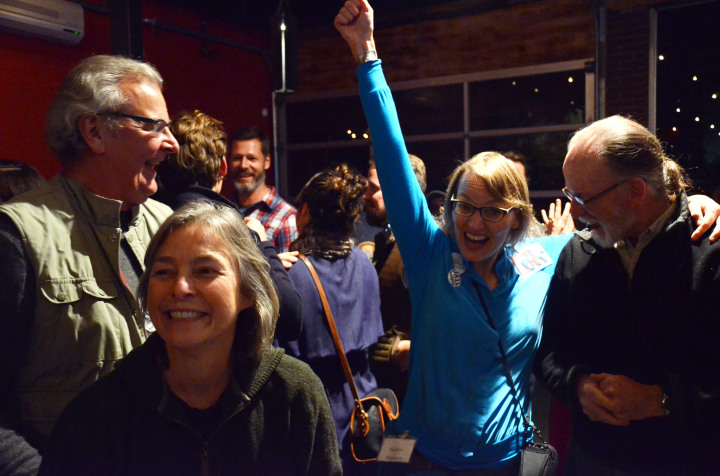



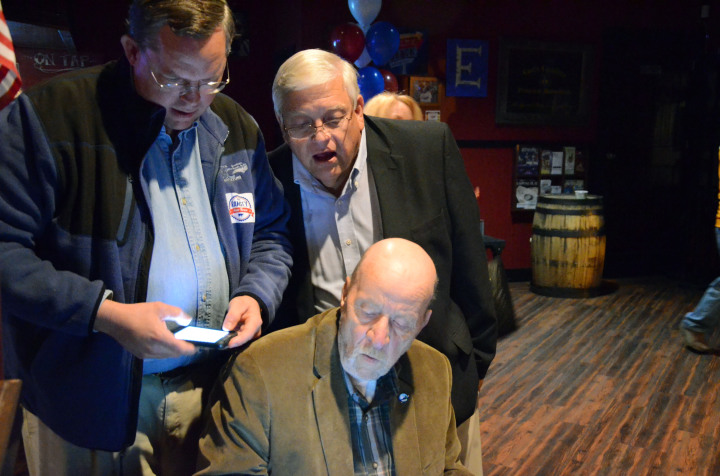
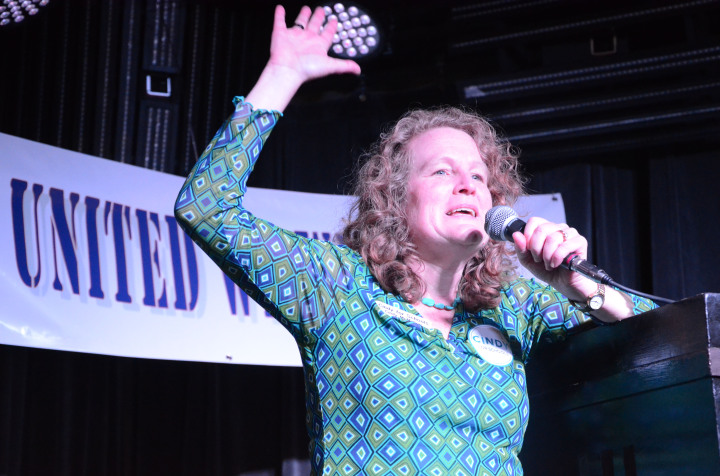


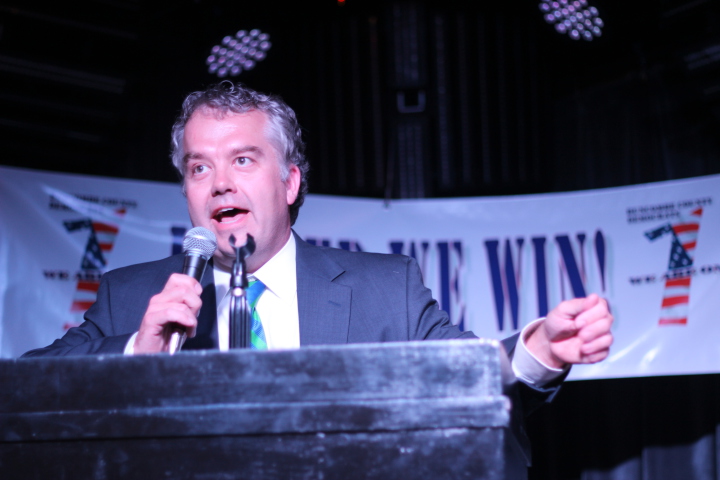


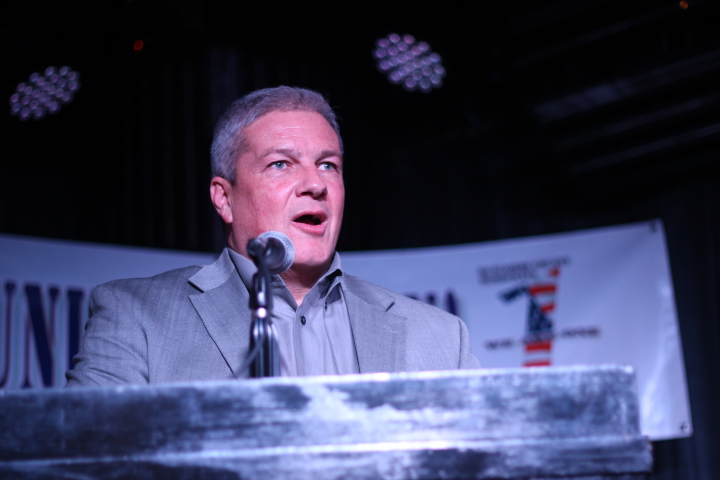
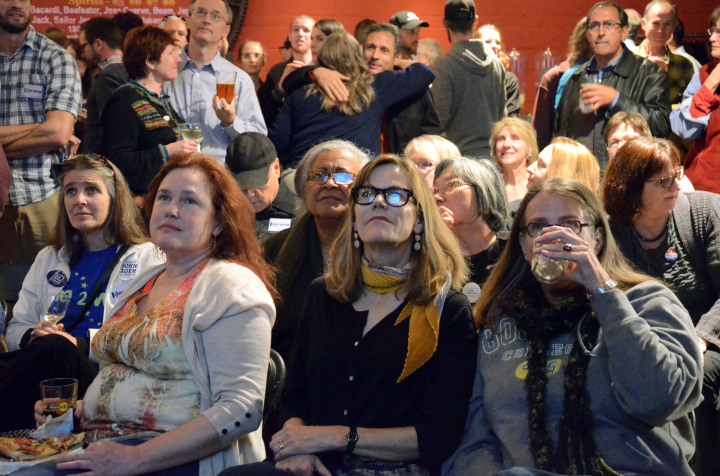




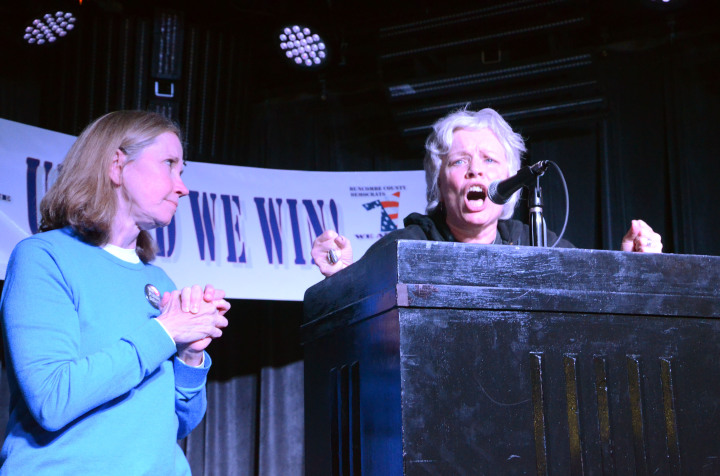
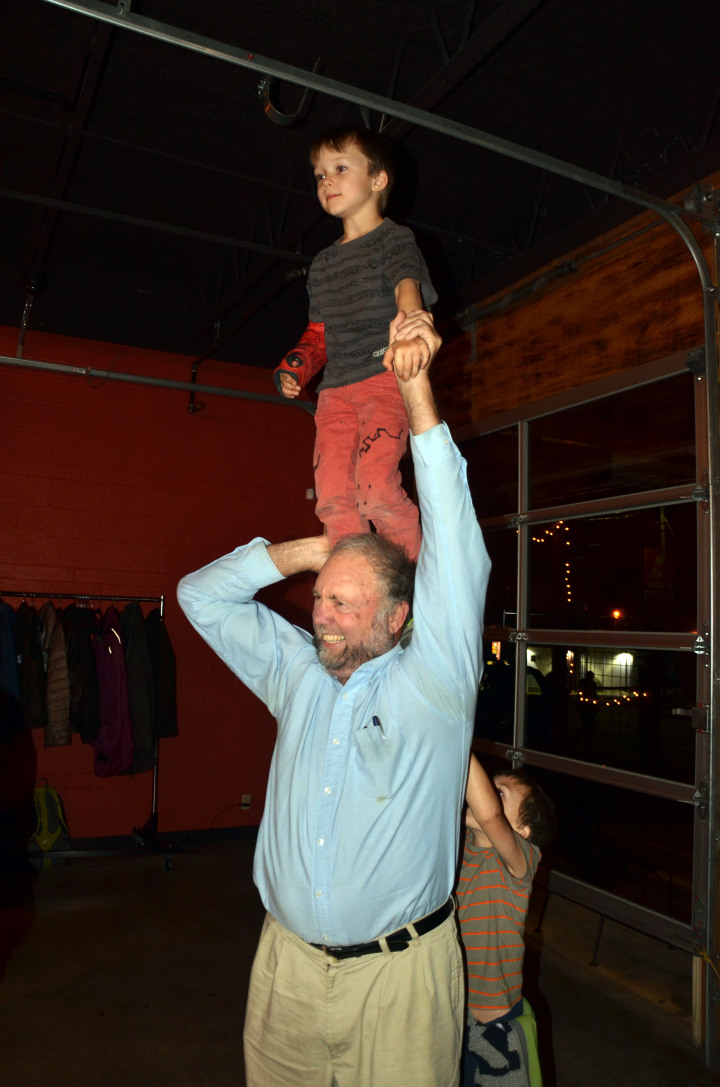
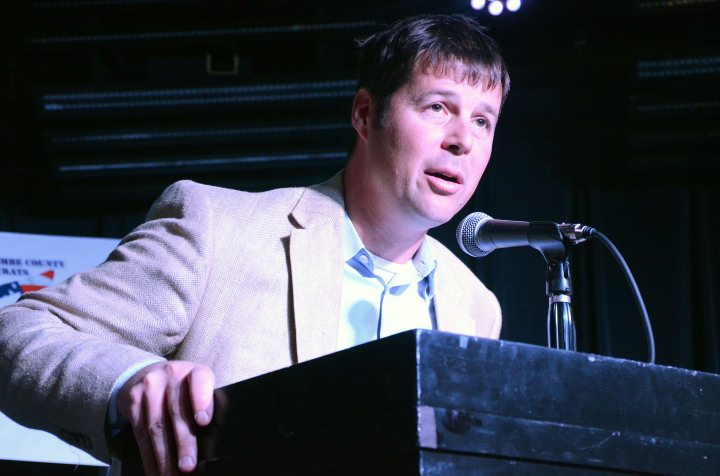


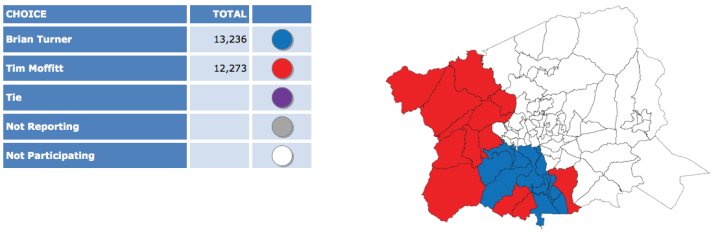
The other item that Sabo didn’t address is that just like in Fairview for Ager, younger, more educated folks are moving into South Buncombe as well. Home prices are cheaper there but access to entertainment as Asheville is relatively easy. Those type of folks are more likely to support Turner.
Not very educated if they’d merely question Turner’s stance on UNCA’s teacher pay while taking a stroll around the campus. And seeing the tens of millions being spent on construction and land acquisitions. Turner lies. Problem for the “educated” democrats outside the city limits is they either believe them or ignore them. Continue to do so at their own risk simply because as a double taxed resident, I want those in the county to join me at the disgust of paying for basically nothing but crony capitalism, an art museum, and subsidies that benefit 1 percenters. All the while the sidewalk in front of my house is still unrepaired due to a water pipe bursting from OVER A YEAR AND HALF AGO. Which in itself leaked water for over 3 months before being repaired. Local government stacked with the likes of Turner do nothing for me and the majority. And moronic democrats who vote these tools in and yet put “critical thinking” bumper stickers on their cars are lacking in just that.
“Local government stacked with the likes of Turner do nothing for me and the majority.”
Curious, I would have to say you are not in the majority sir. I am one of those educated that have moved out into the county from the city and I can do simple arithmetic and see that when the number of votes for the democratic candidate are higher than those for the out of touch republican that does not in fact reflect majority. If you are upset about your sidewalk I suggest you take it up with Miranda, she was your choice.
Ah by majority I mean the majority of residents. You think in term of politics and that’s as far as you go. As far as you ever will go. Problem for local democrats is there’s rampant cronyism, deceit, and elitism and they are not speaking up at all about it. Blind tools and hypocrites. When UNCA is spending tens of millions and Turner comes along complaining of teacher pay there, simple arithmetic says there’s plenty of money. Yet did Turner voice his concern at UNCA, the UNC system, or did he play politics and go after the legislature?
I’m not upset at anything. Because the APD is but one example of not only corruption in local government, but of failure. It’s what happens when elitism hits those that “think” they are immune. If anything, I’m disgusted.
Oh, and I’m not a republican.
What does Debrul have to do with sidewalk repair in the city? Nada.
I believe those maps of red/blue precincts are only counting election day votes, and many of those precincts were very close. A full canvas including early voting results, which favored Democrats, will turn many of those from red to blue.
Missing from any post-election analysis on Turner/Moffitt are the issues that none of our local media really covered: privatization (P3s), tolls on interstates, and warrantless drone surveillance. For many of his conservative supporters, Tim Moffitt was on the wrong side of all of those issues, and I believe many of them withheld their votes because of it. They heard about them through other media like the Tea Party website & emails that got sent around, conservative websites like the Daily Haymaker, his poor performance at the CIBO and 570/880 debates, and his disastrous appearance at the Tea Party meeting 5 days before Election Day.
And from talking to a few of them, some genuinely disagree with using the power of the State to seize municipal assets like water systems, despite not liking the City of Asheville very much.
I think these are the things that cost Moffitt the votes he should have been able to count on in a R+6 district.
“and his disastrous appearance at the Tea Party meeting 5 days before Election Day.”
What happened?
He made statements on drones and the process of the legislation that he co-sponsored which got snuck into law that were not credible, and also lashed out at Tea Party leader Jane Bilello for questioning his previous not-credible statements on the drone legislation.
He then made false (or to be charitable, completely inaccurate) statements on the issue of toll lanes on I-77, a sign of what might be coming to I-26:
“That’s just conversations that are happening – no commitments have been made.” False: the contracts with the Spanish company Cintra have been signed. They expect to fully secure financing sometime this month, and final design work, permit approval and pre-construction will begin before the NCGA reconvenes in January. The commitment has been made.
“Well those contracts can be cancelled out.” False: while technically true that the NCGA could pull out of a deal after the private contractor had secured financing and begun construction, to do so would be (in the words of a legislative staffer I talked to) “like dropping a bomb on the State’s reputation in the bond market.”
“It’s up to the General Assembly to provide funding for it to allow it to go forward… the Legislature has not made a commitment.” False: all the State funding for the I-77 HOT lanes project is already authorized in previously-passed legislation. The NCGA has no more role to play in the project.
Suffice to say, it’s unlikely that anybody in attendance was buying these answers. In my view, it sealed the impression that Tim either didn’t know what he was talking about regarding topics very important to conservatives, or he wasn’t being honest. And that resonated outwards in Tea Party emails over the following few days up to the election.
Thanks. Very interesting.
Give the results in this race when compared to the results in the district 3 County Commission race another factor that may have come into play, and oh what a delicious irony this would be if it is true, is that the absence of straight party voting may have cost Moffitt some votes given how far he ran behind Miranda DeBruhl’s final tally.
Once the vote canvasing places the early vote into the proper precinct more light might be shed on the many theories as to why he lost.
That would be ironic, and yes – I think it contributed to his loss. Don’t know if we’ll ever know for sure, unfortunately…
Toll roads. “We the (smart) people” had an easy out when Cintra missed it’s original finance deadline. Did our leaders take advantage of the missed deadline, collect the penalty from Cintra, and walk away from “for profit” tollroads? No. These leaders don’t represent the people; they represent special, for profit, interests. To say that “the people” must want toll roads since they elected pro-toll candidates is false logic as well; these pro-toll candidates received outside money to pimp “the boardwalks”. Corporate personhood is for idiots.